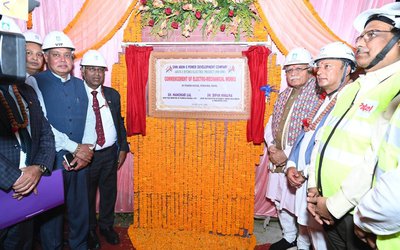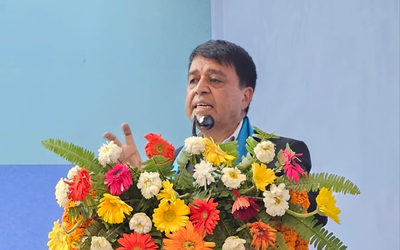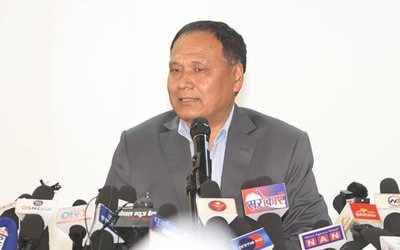
At a time when Nepal's infrastructure growth is lagging behind due to apathy from the private sector in making investment, by announcing the first infrastructure summit, the Confederation of Nepalese Industries has shown where there is a will, there may be a way.
Economists have been saying that the country’s poor infrastructure stands as a hindrance to higher economic growth. According to a recent World Bank study, Nepal has an infrastructure funding gap of $ 13-18 billion from 2011-2020.
According to the World Bank Report, Nepal needs the most resources for electricity followed by the transportation sector. The country will require as much as $ 5.3-7 billion for electricity while the transport sector will require $ 3.7-5.5 billion.
The Confederation of Nepalese Industries (CNI), the apex body of country’s manufacturing and service industries, has announced to hold the first “Nepal Infrastructure Summit-2014” on November 11-12. Indian minister for Road, Transport and Highway Nitin Gadkari will be the guest of honor.
"Though Nepal is blessed with a picture perfect terrain and exemplary bio-diversity, its settlements are dispersed and unplanned with grossly inadequate infrastructure. However, infrastructure development is an arduous process, which requires enabling policy and regulations, consensus between the government and private sector, mobilization of networks, knowledge and expertise, and incentives and financing," said Narendra Kumar Basnyat, president of CNI. "This summit will be highly significant as it aims to facilitate the discourse on infrastructure development so that Nepal can accelerate its economic growth by fast-tracking domestic and international investments in airports, energy, tourism, agribusiness, mass transit, water management and urban development. This summit will act as a catalyst towards a prosperous Nepal and the thematic areas of coverage include: tourism infrastructure, energy, transportation, urban infrastructure and agriculture."
The Summit aims to start and sustain a national conversation on infrastructure development so that in the future, working closely with the government and the private sector, stakeholders will make policies, regulations, networks, know-how, financing and expertise available for infrastructure development in Nepal. At the Summit, which would be hosted in collaboration with the IBN, outlook and opportunities for investment in infrastructure in Nepal would be discussed and identified.
"Likewise, learning from other countries' experience, a framework for sustainable infrastructure development will be developed. Ways of improving the climate for investment will be put forth so that financing for infrastructure development could be attracted in the coming years," said a press release issued by CNI.
More than 300 selectively invited experts from the government ministries, private sector, donor community and international investment community will attend the Summit, which would also bring lessons from Nepal’s past experiences into wider discussion.
"It will shed light on ways of developing institutional mechanism, by way of an Investment Cell at the CNI, to follow up on the commitments with the government. It will provide a platform for investors who are looking for opportunities while reducing risks. All in all, the Summit, the first of its kind in Nepal, will help build the confidence of local investors while attracting foreign investors. In this way, it will go a long way to help address the funding gap between Nepal’s demand for infrastructural services and the supply of it," said the press release.
As the government has always been in charge of creating and maintaining large-scale infrastructure facilities in Nepal, such as roads, energy, and airports, with help from multilateral and bilateral donor agencies, CNI wants to have certain breakthrough.
"Today, other countries in the region, through regulatory and institutional reforms, are utilizing managerial, financial and technical capabilities of the private sector in infrastructure project execution, leading to efficient completion of projects and rapid economic development using the Public-Private Partnership (PPP) approach. Countries have openly welcomed the concept of private-sector engagement in infrastructure, with the majority demonstrating political consensus around the need," said Basnyat.
The partner organizations include Government of Nepal (GON), Investment Board Nepal (IBN), Youth Community for Nepalese Contractors (YCNC), Japan International Cooperation Agency (JAICA), World Wild Fund (WWF), Nepal Engineering Association (NEA), Federation of Contractors Association of Nepal (FCAN), Independent Power Producers Association Nepal (IPPAN), Society of Consulting Architectural and Engineering Firms Nepal (SCAEF), and Federation of Indian Chambers of Commerce and Industry (FICCI). This will be the first such conference taking up the agenda of infrastructure in Nepal.
- NEPAL-THAILAND: Joint Business Council
- Apr 13, 2025
- BIMSTEC SUMMIT: Nepal’s Stand
- Apr 11, 2025
- IME GROUP: Expands Into Paper Industry
- Mar 24, 2025
- CPN UML: Instigated By India
- Mar 23, 2025
- ADB’S CHIEF ECONOMIST: Nepal Reduces Poverty
- Mar 11, 2025















